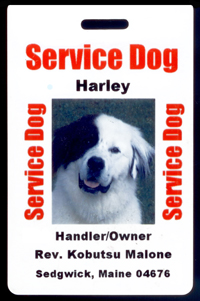Kobutsu
New member
From: http://www.boston.com/news/local/breaking_news/2011/04/ruling_says_lan.html
Ruling says landlords must let AIDS patient keep his dog
By Martin Finucane, Globe Staff
A Massachusetts Commission Against Discrimination hearing officer has ordered the landlords of a Brighton building to pay $25,000 to a tenant with HIV/AIDS for ordering the man to get rid of his emotional support dog or move.
The MCAD also ruled that the landlords should pay a $5,000 fine, "given their utter intransigence" in refusing to discuss a "reasonable accommodation" with the man.
The complaint was brought against Brighton Gardens LP, which owns the Brighton Gardens building on Tremont Street; Lombardi Corp., a general partner in Brighton Gardens LP; and Michael J. Lombardi, president of the Lombardi Corp.
Lombardi called it "an extraordinary decision because they really haven't pinpointed any discrimination" and vowed to appeal.
A doctor recommended that tenant Richard M. Blake, who has had HIV/AIDS for a number of years, get a support dog because they can help lift a patient's mood and improve their mental and physical health, the hearing officer said in her decision.
Blake got a dog in May 2008. In July 2008, the landlords sent tenants a notice saying that a no-pet policy in their leases would be enforced, beginning Oct. 1.
After unsuccessful attempts to get the landlords to accommodate his disability, Blake filed a discrimination complaint with the commission in December 2008.
The hearing officer determined that Blake was disabled and that "the evidence ... supports a finding that requiring Complainant to give up his dog would seriously jeopardize his emotional and physical well-being."
Lombardi said, "My firm did not knowingly discriminate against anybody."
He said the property managers never had any idea that Blake was in a legally protected class -- being disabled -- until "late in the game."
"None of this information was disclosed to property management at the time he was told he had to get rid of his dog," he said.
He also criticized the monetary award by the hearing officer, saying, "I don't know how they got to their number because it's pure fiction from our perspective."
The hearing officer ruled last week. The landlords can appeal the decision to the full commission.
Ruling says landlords must let AIDS patient keep his dog
By Martin Finucane, Globe Staff
A Massachusetts Commission Against Discrimination hearing officer has ordered the landlords of a Brighton building to pay $25,000 to a tenant with HIV/AIDS for ordering the man to get rid of his emotional support dog or move.
The MCAD also ruled that the landlords should pay a $5,000 fine, "given their utter intransigence" in refusing to discuss a "reasonable accommodation" with the man.
The complaint was brought against Brighton Gardens LP, which owns the Brighton Gardens building on Tremont Street; Lombardi Corp., a general partner in Brighton Gardens LP; and Michael J. Lombardi, president of the Lombardi Corp.
Lombardi called it "an extraordinary decision because they really haven't pinpointed any discrimination" and vowed to appeal.
A doctor recommended that tenant Richard M. Blake, who has had HIV/AIDS for a number of years, get a support dog because they can help lift a patient's mood and improve their mental and physical health, the hearing officer said in her decision.
Blake got a dog in May 2008. In July 2008, the landlords sent tenants a notice saying that a no-pet policy in their leases would be enforced, beginning Oct. 1.
After unsuccessful attempts to get the landlords to accommodate his disability, Blake filed a discrimination complaint with the commission in December 2008.
The hearing officer determined that Blake was disabled and that "the evidence ... supports a finding that requiring Complainant to give up his dog would seriously jeopardize his emotional and physical well-being."
Lombardi said, "My firm did not knowingly discriminate against anybody."
He said the property managers never had any idea that Blake was in a legally protected class -- being disabled -- until "late in the game."
"None of this information was disclosed to property management at the time he was told he had to get rid of his dog," he said.
He also criticized the monetary award by the hearing officer, saying, "I don't know how they got to their number because it's pure fiction from our perspective."
The hearing officer ruled last week. The landlords can appeal the decision to the full commission.

